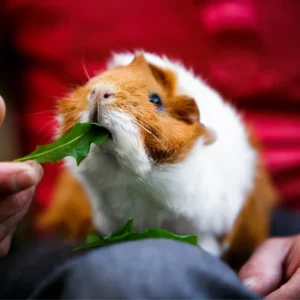Blog
Guinea Pig Food: Crafting A Homemade Naturalistic Diet
As conscientious caretakers of our beloved guinea pigs, providing a wholesome and nutritionally balanced diet is a fundamental aspect of their well-being. In this culinary journey, we’ll explore the art of crafting homemade guinea pig food that goes beyond the store-bought options. From free-feeding hay to a vibrant array of leafy greens, rolled oats, kiwi, blueberries, broccoli, and carrots, each ingredient serves a purpose in promoting the health and happiness of our furry friends. CLICK HERE to watch our visual representation.
Homemade Guinea Pig Food Ingredients:
Free-Feeding Hay (Timothy and Alfalfa):
- Essential for dental health, hay provides fiber that aids in digestion and helps prevent obesity. Timothy hay is a staple, while alfalfa can be given in moderation to younger guinea pigs for its higher calcium content. Free feeding hay allows guinea pigs to limit the growth of their teeth.
Bowl of Leafy Greens:
- A medley of dark, leafy greens such as kale, spinach, and Romaine lettuce offers a rich source of vitamins and minerals, supporting overall well-being. Leafy greens can be free-fed alongside hay.
Rolled Oats:
- A small amount of rolled oats adds a touch of energy to their diet and provides a delightful crunch. Oats contain fiber, promoting a healthy digestive system.
Kiwi:
- Rich in vitamin C and low in sugar, kiwi supports guinea pigs’ immune systems and contributes to healthy skin and fur.
Blueberries:
- Packed with antioxidants and fiber, blueberries promote cellular health and may help prevent certain illnesses.
Broccoli:
- A valuable source of vitamin C and fiber, broccoli contributes to guinea pigs’ overall health and supports their digestive system.
Carrots:
- Carrots provide beta-carotene, which converts to vitamin A, essential for maintaining healthy vision and immune function.
Watching Fruit Intake:
While fruits such as kiwi and blueberries are nutritious, it’s crucial to monitor the amount of fruit given to guinea pigs. Fruits are high in natural sugars, and excessive consumption may lead to obesity and digestive issues. Limit fruit intake to small, bite-sized portions a few times a week and observe your guinea pig’s response to ensure their well-being. Never free-feed fruit. Always consult with a veterinarian for personalized guidance on your guinea pig’s dietary needs.
Best Types of Hay:
The best types of hay to feed guinea pigs are Timothy hay, orchard grass hay, and meadow hay. Timothy hay is a staple in a guinea pig’s diet due to its high fiber content, essential for maintaining digestive health and preventing dental issues. Orchard grass hay is another excellent option, providing a variety in taste and texture while offering similar nutritional benefits to Timothy hay. Meadow hay, a mix of various grasses and plants, adds diversity to their diet and encourages foraging behavior.
Toxic Guinea Pig Food to Avoid:
- Onions and Garlic: Can cause digestive upset.
- Iceberg Lettuce: Lacks nutritional value and can lead to diarrhea.
- Avocado: Contains a substance harmful to guinea pigs.
- Potatoes and Potato Leaves: Contain toxic compounds.
Conclusion:
Crafting homemade guinea pig food allows us to cater to our pets’ specific nutritional needs while strengthening the bond between caretaker and companion. From the essential hay to the array of nutrient-packed fruits and vegetables, every ingredient contributes to the holistic health of these charming creatures. By being mindful of fruit intake and steering clear of toxic foods, we ensure a diet that not only delights their taste buds but also nurtures their well-being.



